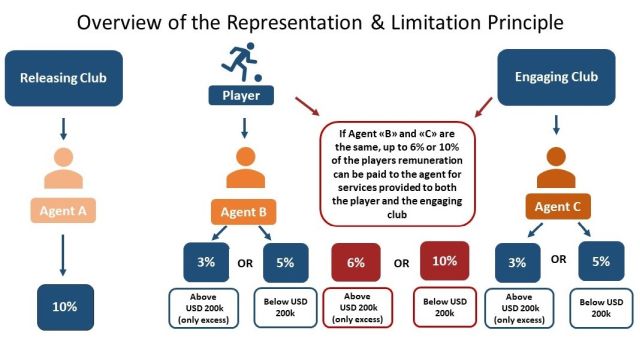- within Employment and HR, Family and Matrimonial and Real Estate and Construction topic(s)
- with readers working within the Media & Information industries
- The new FIFA Football Agent Regulations entered into force on 9 January 2023
- FIFA reintroduced the mandatory licensing system which obliges agents to pass an exam. The legacy path exempts agents from this duty but applications need to be submitted before 30 September 2023
- FIFA introduced remuneration caps on agent's services
- As from 1 October 2023 all representation agreements must comply with the new FIFA Football Agent Regulations
Early this year, FIFA enacted the new FIFA Football Agent Regulations ("FFAR") to improve fair dealing and market transparency. FFAR reintroduces a mandatory licensing system for player agents (FIFA had abolished this obligation in 2015), prohibits multiple representations and stipulates caps for agent fees, all with the objective to reinforce contractual stability, protect the integrity of the player transfer system and enhance financial transparency. The new regulations entered into force on 9 January 2023 but there is a transition period allowing agents to obtain a license and to amend their representation agreements until 1 October 2023.
The FFAR only applies to international transactions. National transfers are regulated by the national football agent regulations of the member associations.
The FFAR have far-reaching implications on the services provided by agents and existing representation agreements with players. The following are the most important changes:
1. Re-introduction of mandatory licensing system
The FFAR obliges all agents, irrespective whether the agent holds a FIFA license issued prior to April 2015 and is registered as an intermediary with a member association, to (i) submit a license application through the new official FIFA Platform, (ii) pass the FIFA agent exam on FIFA regulations and (iii) pay the annual license fee (which for 2023 amounts to USD 600). In addition, agents must meet the requirements of article 5 of the FFAR according to which the applicant is required to proof (i) good standing (i.e. good reputation, no criminal charges and no bankruptcies), (ii) that there are no risks for conflicts of interest, notably because such agent exercises another function in football (e.g. player, coach, club owner) and (iii) has not performed football agency services without the required license 24 months prior the submission of the application for a license.
The license is personal and non-transferable and is granted for an indefinite period, however, subject to compliance with the eligibility requirements. It entitles providing agency services worldwide.
FIFA also introduced the "Continuing Professional Development" ("CPD"), whereby every year agents are required to obtain credits by passing online assessments. The CPD's objective is to ensure minimal and uniform quality standards for agents' services. Agents must pass the annual CPD exams to keep their license. Failure to pass the CPD exam will automatically lead to a provisional suspension of the license.
Agents are exempted from taking the exam when they can proof that they were (i) previously licensed as a FIFA player agent and (ii) registered as an intermediary with a member association between April 2015 and 16 December 2022. This "legacy path" only exempts agents to take the FIFA agent exam but not from meeting the other license requirements. Crucially, such agents need to submit the application before 30 September 2023.
2. Representation agreement
2.1 Formal and content requirements
The representation agreement must be in writing and concluded between the agent and the client prior to the provision of the agency services. Content wise the representation agreement must at least include (i) the names of the parties, (ii) the term, (iii) the agency fee, (iv) the content of the football agent services and (v) the signatures of the parties.
Prior to the conclusion of the representation agreement, agents must inform the client in writing that he/she might seek independent legal advice regarding the representation agreement.
The term of representation is maximum 2 years for players and coaches. However, there is no time limitation if the client is a football club or a member association.
The players and coaches are furthermore protected by certain contractual provisions. FIFA declares provisions null and void which (i) stipulate an automatic renewal of the representation agreement, (ii) limit and/or (iii) penalize the possibility of clients to negotiate and conclude an employment contract without involvement of agents.
In any event, agents are only entitled to the agreed commission if they can prove their involvement in the conclusion or extension of an employment contract. On the other hand, if agents do substantial work and the client (player, coach, club, member association) tries to thwart the agent's commission in bad faith, the contractually agreed commission will be due to the agent.
2.2. Limitations on Representation
In recent years, FIFA allowed agents to conclude agreements with several or all parties involved in a transfer: the player, the releasing club and the engaging club. Clearly, such arrangements potentially led to conflicts of interest. FFAR now limits the possibility of multiple representations. They are now generally prohibited by the FFAR. FIFA permits only the simultaneous representation of the engaging club and the player or the coach if both parties gave their prior written consent for such a double representation. However, the long-established practice by agents to represent the player and the releasing club is now prohibited.
The limitation on multiple representations also applies to affiliates of the agent such as employees, directors, co-owners of the agency or family members.
2.3. Remuneration Cap
The fee caps were the most controversial discussed topic of the FFAR and not welcomed by agents. Agents argued that a cap violates fundamentals on free dealing, in particular the freedom of contract and the principle of private autonomy. FIFA nevertheless introduced the following caps:

The service cap percentages refer to the transfer compensation (representation of a club) or to the gross amount of the fixed salary of the player or coach (representation of a player or coach). E.g., if the transfer fee of player B is USD 1,000,000 and agent A represented the releasing club, agent A is entitled to USD 100,000 (10% of the transfer compensation of USD 1,000,000). If agent B represents player C in the transfer from club D to club E and the annual remuneration of player C is USD 1.000,000, agent B receives 5% of USD 200.000 and 3% of USD 800.000 respectively, resulting in an effective commission of 3.4%.
Agents can also participate in conditional payments due to the player (e.g. winning the national championship). However, agents are not entitled to any payments on sell on fees, i.e. the participation on future transfer compensations. E.g. agent A represents the releasing club B in the transfer of player C to club D for a fee of USD 10,000,000 with a 20% sell-on fee (applied to the future transfer fee related to player A from club D to another club). Player C gets transferred in 2023 to club E for USD 20,000,000, i.e. club B gets 20% of the transfer compensation (USD 4,000,000). Agent A is not allowed to get any payment of the compensation of USD 4,000,000.
A novelty of the new FFAR is the "FIFA Clearing House". All payments of services fees must be made through the FIFA Clearing House.
3. Other rights and obligations
3.1 Approaching potential clients and exclusivity
Potential clients (players, coaches) may only be approached by licensed agents. Other persons such as scouts, performance coaches or administrative staff being part of the same agency can neither approach potential clients nor provide football agent services.
If a player or coach is bound to an exclusivity agreement, i.e. a player or a coach is solely represented by one agent, such potential client may only be approached in the last two months of the client's representation. Approaching players or coaches which are bound to an exclusivity agreement or inducing players or coaches to terminate their representation agreements would constitute violations of the FFAR and would lead to disciplinary sanctions.
3.2 Requirement to represent minors
Approaching and representing minors are specifically regulated in the FFAR. FIFA introduced a new obligation for agents to always approach the legal guardian of a minor. Representation of minors requires agents to pass the designated CPD course for representing minors and to comply with any laws and regulations on minors applicable where the minor will be employed.
Minors cannot be approached earlier than six months before such minor reaches the legal age according to the applicable laws of the country where the minor will be employed. Moreover, it is mandatory that the legal guardian consents in writing prior to the approach of the minor by the agent. A representation agreement with a minor is only valid if it is signed by the minor and the legal guardian.
Any violations of these requirements could lead to a fine of max. USD 1,000,000 and suspension of the license.
3.3 Terminating representation agreements
A representation agreement may be terminated at any time if there is just cause to do so. However, a party terminating the agency agreement without just cause must compensate the other party for any damage incurred. No compensation is due if the representation agreement is terminated with just cause, i.e. when a party can no longer reasonably be expected, according to the principle of good faith, to uphold the contractual relationship for the agreed term.
3.4 Reporting obligations
Agents have a wide range of reporting obligations as of 1 October 2023. Agents are inter alia obliged to upload information relating to representation agreements (conclusions, amendments, terminations), transaction of the client, received payment of service fees, etc. within 14 days to the new FIFA Platform.
4. Dispute resolution system
FIFA's Agent's Chamber of the Football Tribunal has jurisdiction on disputes arising out or in connection with representation agreements regulated pursuant to the FFAR concluded as from 1 October 2023. For disputes of national dimension, the judicial football bodies of the member associations in accordance with their applicable regulations are competent.
The FIFA Disciplinary Committee or FIFA Ethics Committee are competent to impose sanctions on football agents violating the FFAR.
5. Applicability in time
The applicability of the new regulations on existing representation agreements is of utmost importance. There are three categories of contracts:
- Agency agreements which were entered into prior to 16 December 2022: These agreements remain unaffected. However, contractual extensions must comply with the FFAR.
- Representation agreements which are entered into between 16 December 2022 and 30 September 2023: Transfers in the summer window 2023 remain unaffected, therefore the remuneration cap is not yet applicable. As from 1 October 2023 representation agreements must be compliant with the FFAR.
- Representation agreements entered into as from 1 October 2023: All representation agreements concluded as from 1 October 2023 have to fully comply with the FFAR.
Originally published by April, 2023
The content of this article is intended to provide a general guide to the subject matter. Specialist advice should be sought about your specific circumstances.


